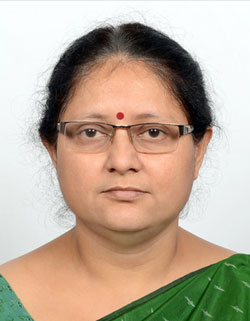Sanghamitra Bandyopadhyay - Computational Challenges in Biology
- Séminaire LIG

Sanghamitra Bandyopadhyay joined the Machine Intelligence Unit of the Indian Statistical Institute as a faculty member in 1999, after completing her PhD from the same Institute. She is currently the Director of the Institute. Her areas of research interest include computational biology and bioinformatics, soft and evolutionary computation, pattern recognition and data mining. In these areas she has published more than 300 research articles in various journals, conferences and edited volumes. She has published six authored and edited books from publishers like Springer, World Scientific and Wiley. Sanghamitra has worked in various Universities and Institutes world-wide including in USA, Australia, Germany, France, Italy, China, Slovenia and Mexico, and delivered invited lectures in many more countries. She has received several awards and fellowships including the Bhatnagar Prize, Infosys award, TWAS Prize, DBT National Women Bioscientist Award (Young), INAE Silver Jubilee Prize, Young scientist/engineer medals of INSA, INAE and Science Congress, JC Bose Fellowship, Swarnajayanti Fellowship and Humboldt Fellowship. She is a Senior Associate of ICTP and Fellow of INSA, INAE, NASI and IEEE. She is currently a member of the Science, Technology and Innovation Advisory Council of the Prime Minister of India.
Over the past few decades, major developments in the field of biology coupled with advances in various omics technologies, e.g., genomic, transcriptomic, proteomic, as well as imaging technologies have led to an explosive growth in the biological information generated by the scientific community. This necessitated the use of innovative computational approaches for analyzing biological data in order to better understand the cellular processes, disease biology and make discoveries. Computational biology and bioinformatics, areas that evolved in response to this challenge, can be viewed as the development and use of computational methods to analyze biological data. Computational methods play a major role in modeling and analyzing biological systems. The interface between biology and computer science has reached a phase where on one hand, advanced technology is challenging developers of algorithms to help analyze the data generated, and on the other, the computational scientists are designing methods based on biological observations to solve difficult problems. The synergistic relationship between biology and computer science is destined to grow at an amazing pace, benefiting both the disciplines immensely.
In this talk, we will first provide an overview of molecular biology and bioinformatics. Thereafter some classical and recently developed computational methods that have been used to solve difficult problems in biology will be discussed. These include methods of sequence analysis, microRNA target prediction, analyses of microRNA induced gene regulatory network and drug design. A few successful applications will be mentioned. The talk will conclude with a mention of some emerging areas of research in computational biology.




